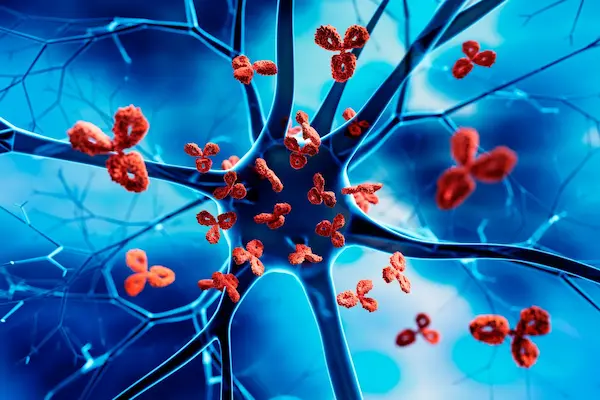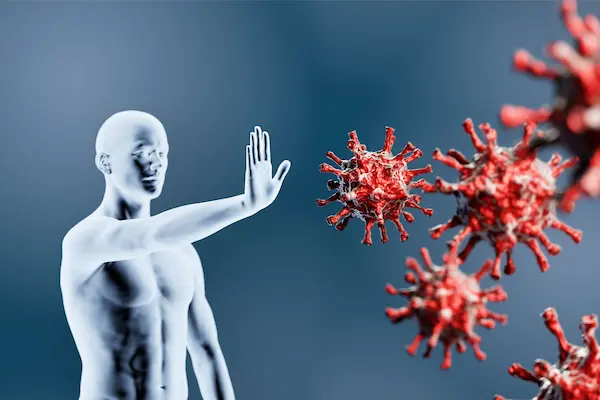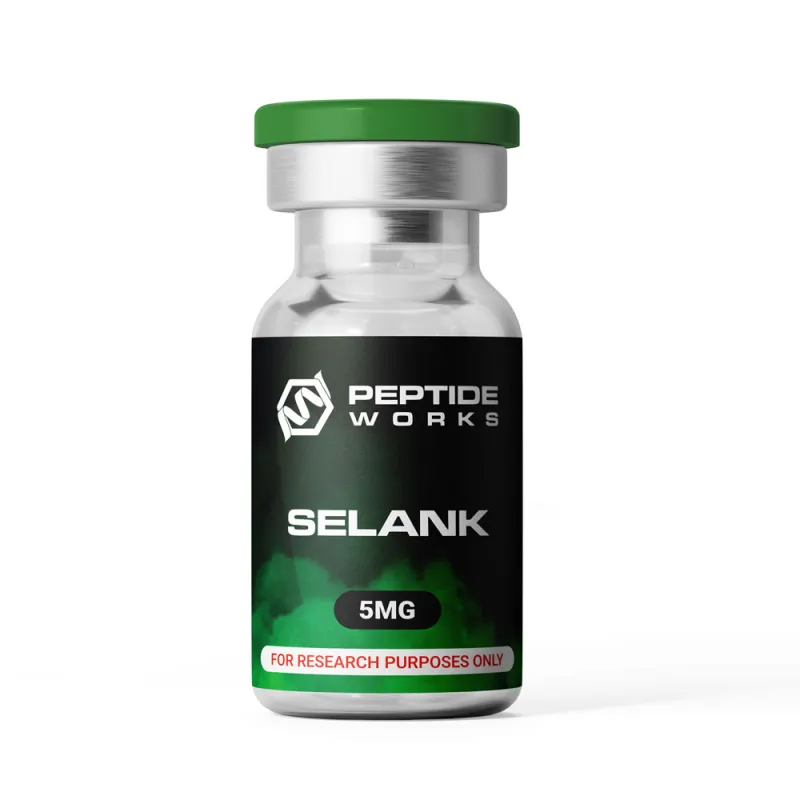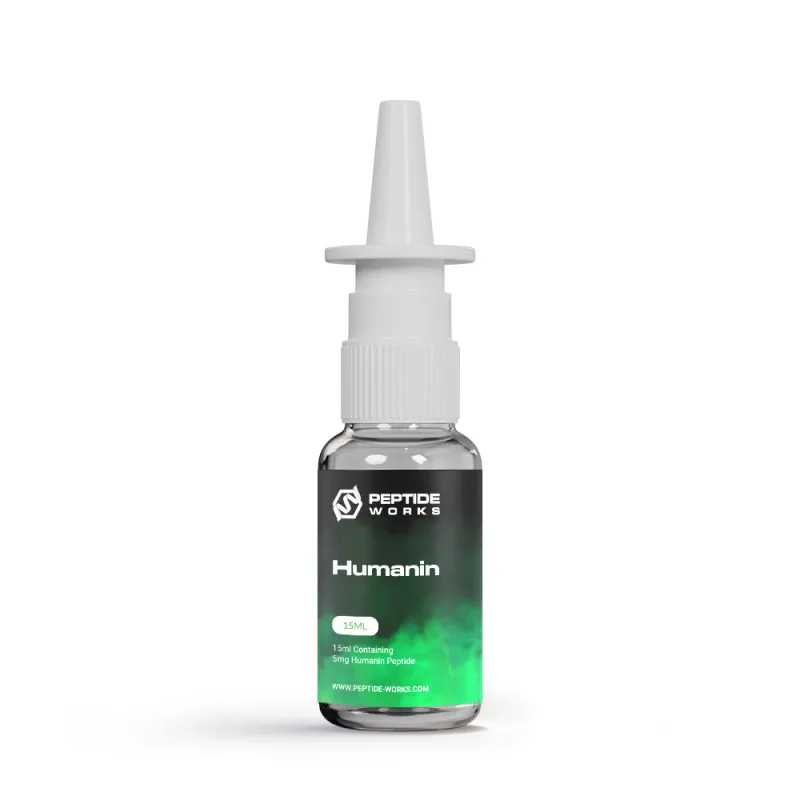
PROMO!
First order? Get 10% OFF with this code: 1storder
Written by

Autoimmune disorders happen when the immune system turns against the body. Instead of protecting, it attacks healthy cells. This leads to swelling, joint pain, skin problems, and damage to the organs. Conditions like lupus, rheumatoid arthritis, and multiple sclerosis are all autoimmune in nature. Managing them is tough because treatments often ease symptoms but do not stop the root cause.
Researchers are now studying peptides as possible tools to support immune stability. One of these is Selank Peptide, a lab-made peptide first explored for mood and brain health. New research suggests it may also affect immune pathways linked to inflammation and overreaction. These findings make Selank peptide an important subject of study in the search for better ways to understand autoimmune disease.
To understand this potential, it helps to see how Selank peptide may influence immune activity at the molecular level.
Explore Selank Peptide from Peptide Works, a research peptide studied for its potential to modulate cytokine activity and support immune balance.

Preclinical studies and small clinical reports suggest Selank peptide may influence immune function by adjusting cytokine activity, the messengers that guide inflammation. Some laboratory findings indicate it may reduce pro-inflammatory markers such as IL-6 and TNF-α while supporting signals that protect tissues, which in research may affect autoimmune activity. This immune-modulating role is one reason Selank peptide has become a focus in laboratory research.
Other peptides also show immune relevance. Humanin peptide protects cells from oxidative strain and damage caused by inflammation, while Epithalon has been reported in experimental studies to support antioxidant defenses and may influence telomere stability, though findings are still preliminary. Both actions connect to immune stability, which is vital in autoimmune disorders. Together, these findings highlight how peptides like Selank, Humanin, and Epithalon are shaping new directions in autoimmune research.
Because cytokine activity is so central to immune function, it’s important to look more closely at how these messengers affect autoimmune disorders.
Discover Humanin from Peptide Works, a mitochondrial-derived peptide researched for its protective effects against oxidative stress and cellular dysfunction.
Cytokines are tiny proteins that tell immune cells what to do. When they work in balance, they help heal the body and fight infection. In autoimmune disorders, this balance breaks. Too many pro-inflammatory cytokines like IL-6 and TNF-α push the immune system into attack mode. This creates swelling, fatigue, and long-term damage.
Animal studies and preliminary research suggest Selank peptide may influence pro-inflammatory messengers like IL-6 and TNF-α, potentially reducing harmful immune activity in laboratory conditions, though more research is needed. Humanin also protects cells by lowering strain and blocking inflammation linked to these cytokines. Epithalon supports healthy cell function and adds protective antioxidant support, which may ease immune overreaction. Together, these peptides highlight new ways researchers study cytokine control in autoimmunity.
But cytokines aren’t the only drivers of autoimmunity; oxidative stress also plays a major role in worsening immune imbalance.

Oxidative stress builds when reactive oxygen species (ROS) overwhelm the body’s defenses. This damage strikes DNA, lipids, and mitochondria, which weakens cells and fuels inflammation. In autoimmune disorders, excess ROS raises immune activity, making flare-ups harsher and symptoms harder to control.
Peptides show different roles in this process. Humanin protects mitochondria from oxidative injury and helps cells survive pressure. Epithalon strengthens antioxidant pathways and supports telomere stability, which may reduce chronic inflammation. By modulating cytokines, Selank peptide may indirectly affect processes triggered by oxidative stress, but this connection is still under investigation.
Since mitochondria both generate ROS and fuel immune cells, their health becomes another key piece of the autoimmune puzzle.
Shop Epithalon from Peptide Works, a synthetic peptide investigated for its antioxidant support and potential role in telomere stability and healthy cell function.
Mitochondria act as the body’s power plants. When they fail, they release mitochondrial DNA (mtDNA) and stress signals that confuse the immune system. These signals can act like false alarms, fueling stronger autoimmune attacks and worsening tissue injury. Low energy output from weak mitochondria also explains the deep fatigue common in autoimmune flare-ups.
Humanin supports mitochondrial resilience under oxidative pressure, helping immune cells maintain balance. Epithalon reduces strain through telomere support and stronger antioxidant action. Selank’s potential role here is indirect, since preliminary evidence suggests it may modulate cytokine responses associated with mitochondrial stress. These roles highlight how peptide research may connect mitochondrial health with balanced immune activity.
Energy output from mitochondria doesn’t just affect cells it also shapes how immune cells fuel themselves, making metabolism another crucial factor.

Immune cells switch between glycolysis for quick fuel and oxidative phosphorylation for steady energy. In autoimmune disease, this switch gets stuck. T-cells and B-cells keep burning fuel in overdrive, which pushes them to attack healthy tissue and drive inflammation.
This strain harms mitochondria. Humanin helps protect them from cellular pressure, while Epithalon reduces oxidative load and supports stability in aging pathways. When high energy use triggers cytokine surges, Selank Peptide is studied for calming that response. These links show how broken metabolism can fuel stronger autoimmune flare-ups.
Because each peptide works in its own way, it’s helpful to compare them side by side to see how their roles differ.
Different peptides show unique strengths in autoimmune research. Selank Peptide stands out for immune signaling, with studies linking it to calmer cytokine activity. Humanin draws interest for protecting mitochondria and reducing stress signals that fuel inflammation. Epithalon shows potential by supporting antioxidant defenses and telomere stability, which may lower chronic immune strain.
That’s why at Peptide Works, we provide researchers access to Selank, Humanin, and Epithalon so these mechanisms can be studied in depth. While each peptide acts on a different mechanism, their combined insights may guide future discoveries in immune stability.
| Peptide | Primary Research Focus | Autoimmune Relevance |
|---|---|---|
| Selank Peptide | Cytokine modulation, immune signaling | Laboratory studies suggest it may support research into immune response modulation |
| Humanin | Mitochondrial protection, stress control | Helps lower oxidative damage linked to autoimmunity |
| Epithalon | Antioxidant support, telomere stability | May reduce chronic inflammation and support cell resilience |
As this field grows, researchers are especially interested in what role Selank might play in the future.
The future of Selank peptide in autoimmune research remains at an early investigational stage, but laboratory findings on cytokine modulation suggest it could be a candidate for further study. As science uncovers more about how the nervous and immune systems interact, Selank could play a bigger role in guiding immune balance. Researchers are also watching how it compares with mitochondrial peptides like Humanin and Epithalon, which may complement Selank’s immune effects.
At Peptide Works, we support this progress by providing high-quality peptides for research worldwide. By making Selank, Humanin, and Epithalon available to the scientific community, we hope to see new discoveries that shape the future of autoimmune care.
All products discussed are supplied for research purposes only and are not intended for human use.
[1] Leonidovna YA, Aleksandrovna SM, Aleksandrovna TA, Aleksandrovna BO, et al. The Influence of Selank on the Level of Cytokines Under the Conditions of “Social” Stress. Curr Rev Clin Exp Pharmacol. 2021;16(2):162-167.
[2] Volkova A, Shadrina M, Kolomin T, Andreeva L, et al. Selank Administration Affects the Expression of Some Genes Involved in GABAergic Neurotransmission. Front Pharmacol. 2016 Feb 18;7:31.
[3] Thummasorn S, Shinlapawittayatorn K, Khamseekaew J, Jaiwongkam T, et al. Humanin directly protects cardiac mitochondria against dysfunction initiated by oxidative stress by decreasing complex I activity. Mitochondrion. 2018 Jan;38:31-40.
[4] Coradduzza D, Congiargiu A, Chen Z, Cruciani S, et al. Humanin and Its Pathophysiological Roles in Aging: A Systematic Review. Biology (Basel). 2023 Apr 6;12(4):558.
[5] Al-Dulaimi S, Thomas R, Matta S, Roberts T. Epitalon increases telomere length in human cell lines through telomerase upregulation or ALT activity. Biogerontology. 2025 Sep 4;26(5):178.
[6] Araj SK, Brzezik J, Mądra-Gackowska K, Szeleszczuk Ł. Overview of Epitalon-Highly Bioactive Pineal Tetrapeptide with Promising Properties. Int J Mol Sci. 2025 Mar 17;26(6):2691.
ALL CONTENT AND PRODUCT INFORMATION AVAILABLE ON THIS WEBSITE IS FOR EDUCATIONAL PURPOSES ONLY.
DISCLAIMER: These products are intended solely as a research chemical only. This classification allows for their use only for research development and laboratory studies. The information available on our Peptide Works website: https://peptide-works.com/ is provided for educational purposes only. These products are not for human or animal use or consumption in any manner. Handling of these products should be limited to suitably qualified professionals. They are not to be classified as a drug, food, cosmetic, or medicinal product and must not be mislabelled or used as such.
Peptide Works
Related Articles

What are the Best Cognitive Peptides?
Cognitive peptides are short chains of amino acids that researchers are exploring for their potential effects on brain function. They

Achieving increased skin pigmentation without prolonged sun exposure has been demonstrated with Melanotan peptides in research. Two commonly studied options,

Can PTD-DBM Hair Growth Peptide Stop Balding?
Hair thinning and balding affect millions worldwide, often leading to frustration and limited options. This challenge has driven researchers to